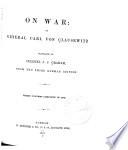Works

On War
Carl von ClausewitzFamous Carl von Clausewitz Quotes
“There are cases in which the greatest daring is the greatest wisdom.”
Variant: There are times when the utmost daring is the height of wisdom.
Source: On War (1832), Book 2
“War is nothing but a continuation of politics with the admixture of other means.”
Variant: War Is Merely the Continuation of Policy by Other Means
Source: On War (1832), Book 1, Chapter 1, Section 24, in the Princeton University Press translation (1976)
Variant translation: War is merely the continuation of politics by other means.
Context: War Is Merely the Continuation of Policy by Other Means
We see, therefore, that war is not merely an act of policy but a true political instrument, a continuation of political intercourse carried on with other means. What remains peculiar to war is simply the peculiar nature of its means.
Source: On War (1832), Book 1, Chapter 1, Section 3, Paragraph 1.
Context: Kind-hearted people might of course think there was some ingenious way to disarm or defeat the enemy without too much bloodshed, and might imagine this is the true goal of the art of war. Pleasant as it sounds, it is a fallacy that must be exposed: War is such a dangerous business that mistakes that come from kindness are the very worst.
Carl von Clausewitz Quotes about war
“War is such a dangerous business that mistakes that come from kindness are the very worst.”
Source: On War (1832), Book 1, Chapter 1, Section 3, Paragraph 1.
Context: Kind-hearted people might of course think there was some ingenious way to disarm or defeat the enemy without too much bloodshed, and might imagine this is the true goal of the art of war. Pleasant as it sounds, it is a fallacy that must be exposed: War is such a dangerous business that mistakes that come from kindness are the very worst.
On War (1832), Book 1
Carl von Clausewitz: Trending quotes
Source: On War (1832), Book 1, Chapter 3.
Context: Strength of character does not consist solely in having powerful feelings, but in maintaining one’s balance in spite of them. Even with the violence of emotion, judgment and principle must still function like a ship’s compass, which records the slightest variations however rough the sea.
“The conqueror is always a lover of peace; he would prefer to take over our country unopposed.”
Source: On War (1832), Book 6, Ch. 2
Carl von Clausewitz Quotes
On War (1832), Book 3
“Timidity is the root of prudence in the majority of men.”
On War (1832), Book 3
On War (1832), Book 3
On War (1832), Book 2
Source: On War (1832), Book 6, Chapter 17.
On War (1832), Book 1
“…the side that feels the lesser urge for peace will naturally get the better bargain.”
On War (1832), Book 1
On War (1832), Book 2
“…in the whole range of human activities, war most closely resembles a game of cards.”
On War (1832), Book 1
“…talent and genius operate outside the rules, and theory conflicts with practice.”
On War (1832), Book 2
On War (1832), Book 2
On War (1832), Book 2
“To introduce into the philosophy of War itself a principle of moderation would be an absurdity.”
Variant translation: To introduce into the philosophy of war a principle of moderation would be an absurdity.
As quoted in The Campaign of 1914 in France and Belgium (1915) by George Herbert Perris, p. 56.
Source: On War (1832), Book 1, Chapter 1, Section 3, Paragraph 3
On War (1832), Book 1
Source: On War (1832), Book 1, Ch. 7, as translated by Michael Howard and Peter Paret (1976).
Source: On War (1832), Book 1, Chapter 3.
On War (1832), Book 2
“The state of crisis is the real war; the equilibrium is nothing but its reflex.”
On War (1832), Book 3
“War is an act of violence pushed to its utmost bounds.”
Variant translation: War is an act of violence which in its application knows no bonds.
As quoted in The Campaign of 1914 in France and Belgium (1915) by George Herbert Perris, p. 56.
Source: On War (1832), Book 1, Chapter 1, Section 3, Paragraph 8
“War therefore is an act of violence to compel our opponent to fulfill our will.”
Source: On War (1832), Book 1, Chapter 1, paragraph 2.
On War (1832), Book 3
Ch 3 : Moral Factors, as translated by Michael Howard and Peter Paret.
On War (1832), Book 3
On War (1832), Book 2
“What is the object of defense? To preserve. To preserve is easier than to acquire.”
Source: On War (1832), Book 6, Chapter 1.
Source: On War (1832), Book 6, Chapter 1.
